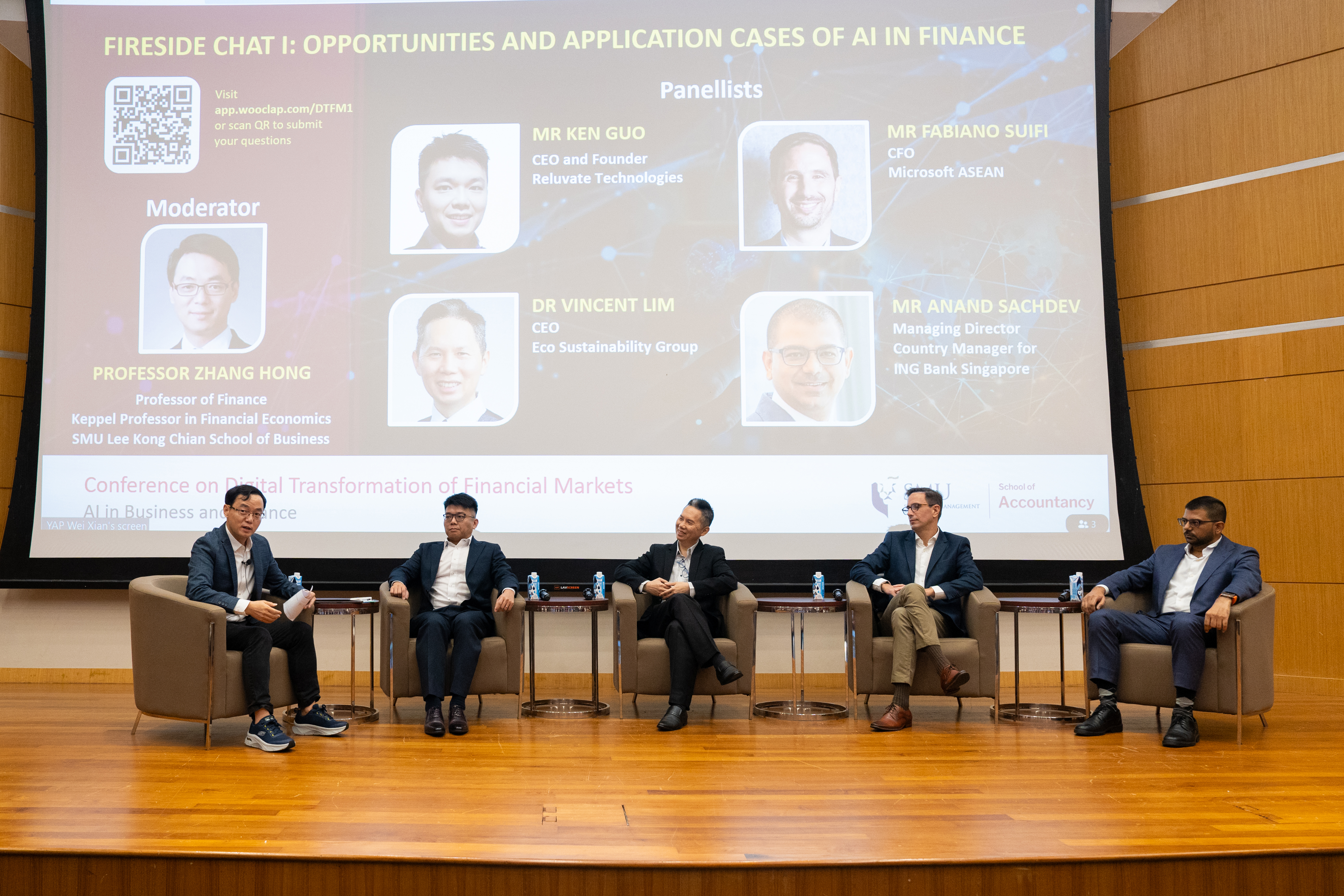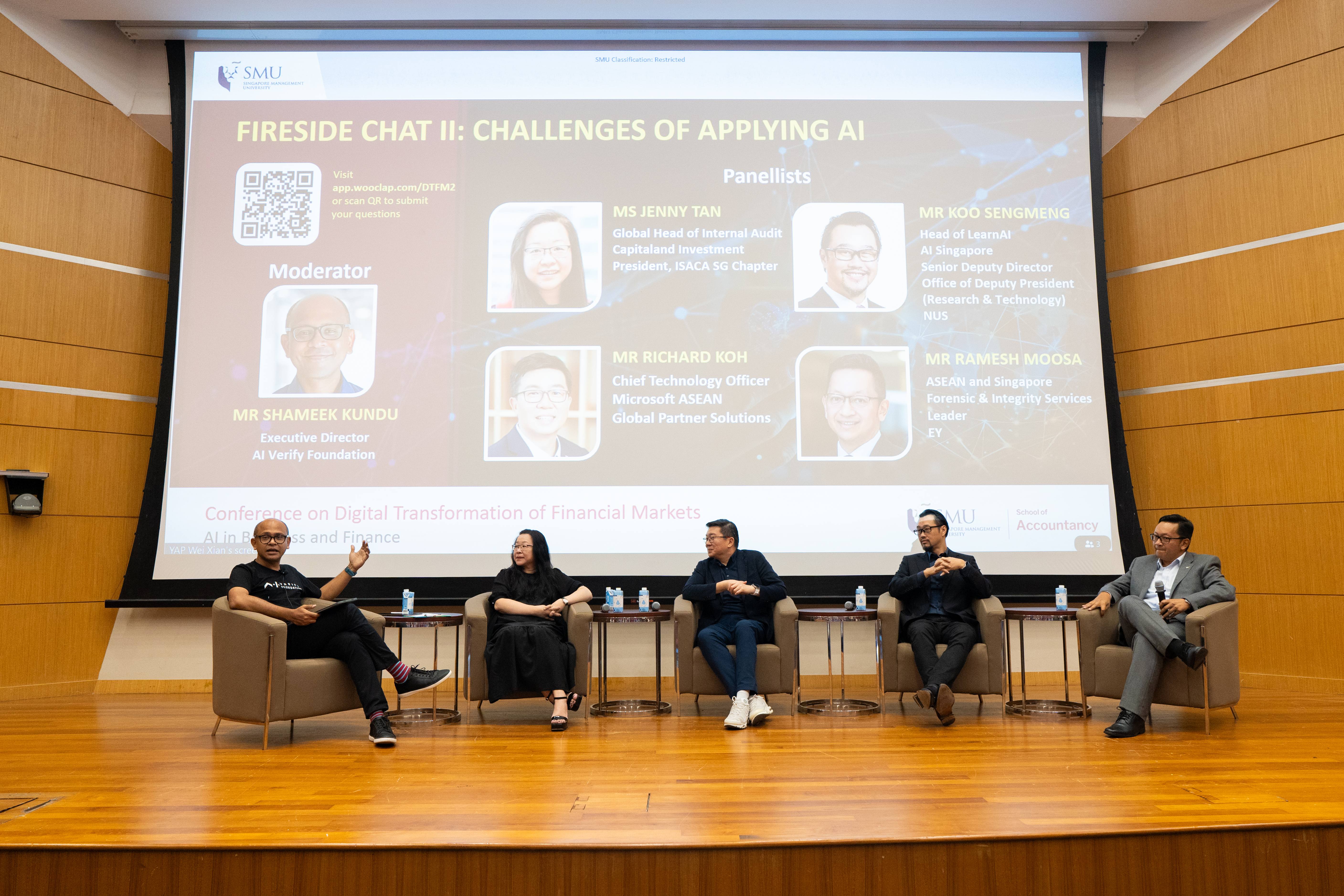
On Thursday, 17 October 2024, the Singapore Management University’s (SMU) School of Accountancy (SOA) hosted the Conference on Digital Transformation of Financial Markets 2024. This is the third year the conference has been held since a well-received inaugural conference in 2021.
Eye on Digital Transformation

The conference this year turned the spotlight on “AI in Business and Finance”, a pertinent and timely topic given how quickly AI technologies have evolved in recent years.
Discussions at the conference explored the transformative power of AI in reshaping financial markets, as well as its role in providing opportunities for innovation, growth, and efficiency. SMU faculty also presented two research papers during the event, enriching the audience’s understanding of the impact of AI.
In his opening remarks at the conference, SMU Provost Professor Timothy Clark shared that the conference was a perfect illustration of SOA’s focus on Digital Transformation – one of the three strategic priorities identified by SMU in 2020.
“With respect to developing and changing the future of our students, we recognise that acquiring digital skills and knowledge of AI’s ascension in this rapidly evolving technological landscape is key,” he said.
Professor Clark went on to share some of the ways in which SMU is equipping students to thrive in this landscape, such as courses in digital technology being added to the graduation requirements from this academic year.
Moreover, a digital intelligence track was launched at this year’s iteration of the SMU Global Summer Programme — an annual event allowing students from around the world to gain new insights on trends in Asia and engage with industry leaders. Since 2018, SOA has been offering a Master of Science in Accounting (Data and Analytics) and a second major in Accounting Data and Analytics for undergraduate.
Continuous learning to maintain relevance

Delivering the keynote address, Mr Teo Ser Luck, President of the Institute of Singapore Chartered Accountants (ISCA), shared some of the findings from ISCA’s research into AI. One of the biggest takeaways from the research is that AI is not about to replace accountants altogether.
“The key thing is upgrading yourselves. Continuous education and learning is the most critical, but the most important thing is what you learn,” he said.
“Companies must take some responsibility in training its employees and accountants so that we can co-exist with AI, or any technologies that advance the industry.”
Mr Teo also shared how, rather than making human expertise redundant, AI in fact offers opportunities to augment human expertise, enabling professionals to focus on other tasks. Based on ISCA’s research, some 60 to 100 per cent of critical work functions can be augmented by AI, and what this means is that future graduates will find themselves conducting more strategic work, rather than starting out with more mundane tasks.
In addition, 82 per cent of employees surveyed by ISCA responded that they expect AI to enhance job performance, which shows that the sentiment has shifted from a fear of being made redundant to understanding that AI can be used to improve working processes.
The opportunities and impact of AI on industries and jobs
The first fireside chat of the conference focused on the opportunities and application cases for AI in finance, as well as the opportunities and challenges that these will pose to professionals in the field.
Professor of Finance at SMU Lee Kong Chian School of Business (LKCSB) Zhang Hong was the moderator for the session. He kicked it off with a discussion on the financial industry sectors most impacted by AI.
In response, Mr Anand Sachdev, Managing Director and Country Manager for ING Bank Singapore, referred to a Mackenzie report on the economic potential of generative AI, identifying how algorithms such as ChatGPT could add trillions of dollars in value to the global economy. While the technology is expected to have a significant impact across all industry sectors, AI is likely to have the greatest influence on banking, he added.
Mr Sachdev then presented some examples of the opportunities in which AI could be applied in the banking industry, including hyper-personalisation of financial products, and creating new revenue models in embedded finance. It will also play a significant role in risk management, especially in areas like fraud analysis and credit scoring.
AI is also expected to make a big impact in terms of productivity.
“In banks and in fact most industries, when you create pitch presentations or strategy decks, a lot of the information used across firms is repetitive, or it is the same context that has to be brought into these presentations. Generative AI presents you the opportunity to be a lot more efficient about how you do some of these tasks,” he said.
Mr Fabiano Suifi, CFO of Microsoft ASEAN also delved into the importance of building a culture that encourages adoption of AI technologies to smoothen its integration into various workflows.
“You have to create a culture where it’s okay to fail – where you can try and adopt these technologies into various use cases without unexpected negative impact on your career,” he urged.
To support the increased use of AI, the processing power deployed will increase, naturally increasing the power required to support the technology. This raises the question of whether there is a trade-off between the advantages provided and the energy consumed to provide these benefits.

Dr Vincent Lee, CEO of Eco Sustainability Group, expressed his belief that AI use does ultimately benefit sustainability efforts. “We have to look at it holistically – at the efficiency gain we get from using AI. For example, Google conducted a data centre analysis and they used AI to analyse the energy consumption and optimise it. As a result of this, they were able to become 40 per cent more efficient,” he shared. “I truly feel that the efficiency gained from using AI outweighs (the energy consumption).”
As for the impact that AI might have on jobs, Mr Ken Guo, CEO and Founder of Reluvate Technologies shared a personal anecdote.
“I was asked by my manager what I wanted to set my key performance indicators as, and I jokingly said that I wanted to eliminate myself in order to do jobs that I enjoy,” he said.
“Turns out that I was able to automate 70 to 80 per cent of my job as an employee with AI automation, but that freed up time and allowed me to pursue more interesting projects.”
The panellists agreed that AI automation will certainly take over certain job functions – but it is more likely to change the nature of different jobs rather than replace them altogether. As such, organisations, institutions and individuals all have a part to play in creating a culture of continuous learning, whereby individuals are continuously upskilling themselves to leverage the benefits of AI. At the same time, it is important for individuals to also identify how they can add value, beyond executing mundane tasks that AI can inevitably do better and faster.
Challenges in applying AI

While AI can undoubtedly improve creativity, it brings with it challenges such as data security issues and data-driven discrimination. This was the focus of the second fireside chat, which was moderated by Mr Shameek Kundu, Executive Director of the AI Verify Foundation.
Mr Ramesh Moosa, ASEAN and Singapore Forensic & Integrity Services Leader at EY (Ernst & Young) highlighted that one of the biggest concerns when it comes to AI is the integrity of the data that is used to build or train the AI.
“The first question is, do we have the right data and algorithms so that the system is free from bias?” he asked, elaborating that if a company’s historical data indicates that high performers come from a certain demographic, and that data is then used to train these systems, the system will end up discriminating based on information such as the person’s age and gender.
One way to circumvent this is to not build an AI algorithm based purely on historical data, and instead review it to catch these biases and rectify them before deployment.
Another challenge in AI actually lies in the end users – specifically their resistance or lack of readiness to adopt the technology. Ms Jenny Tan, Global Head of Internal Audit, CapitaLand Investment and President of the ISACA SG Chapter shared her experience working with various consultants, who often did not see a reason to adopt the technology when it comes to the mundane tasks that they are used to doing.
This point was also reiterated by Mr Sengmeng Koo, the Head of LearnAI, AI Singapore, sharing how companies that approach AI Singapore sometimes lack a clear idea of what they want to achieve through the adoption of AI.
“Most companies are not native AI users, so how do you reap the business value of the AI model when it has been built and in production? …AI engineers or AI engineering capabilities need to be embedded in the company, whether it is on premise or by working with technology partners,” he explains.
Mr Richard Koh, Chief Technology Officer of Microsoft ASEAN, Global Partner Solutions, highlighted another challenge — the sheer number of AI-powered tools that are springing up.
“There are challenges surrounding Generative AI, like deep-fakes, for example. At the end of last year, we were looking at just over 100 tools that can generate audio from a short voice clip. Now, we’re looking at over 300 tools,” he said going on to compare the current state of AI with the state of the internet in the 1990s.
“This is a time when different companies and different startups are all creating tools to exploit or leverage a new general purpose technology, and I will encourage everyone to keep an ear out and keep updated because these technologies might not necessarily be the right choice here and now.”
While there is no perfect solution, panellists agreed that AI governance is necessary to ensure that the technology is implemented in a controlled manner, with strict rules implemented around accuracy to increase its reliability. This increased reliability can also go a long way in driving adoption and acceptance of the technology for the layman.
And while it is critical for the government to set appropriate frameworks guiding the legality of AI technology, internal governance is just as important.
“During audits, what we’ve typically found is that tech risks and technology always fail when it comes to inventory, particularly with emerging technologies,” shared Ms Tan. “You have to really document the kind of data utilised in AI training, to provide greater control over all aspects of data governance and data protection.”
Balancing innovation with ethical concerns
In his closing remarks, Professor Liandong Zhang, Deputy Dean of SOA highlighted a common point that underscored the conference: the importance of preparing students and professionals to thrive in this evolving landscape.
He also reflected on how the afternoon’s panellists had repeatedly emphasised the urgency of establishing AI governance frameworks to ensure that AI is applied responsibly and effectively.
Summarising the key takeaways of the afternoon, Professor Zhang said that embracing and using AI technologies has now become essential, going on to highlight that it is imperative that we embrace innovation in a responsible way.

“Responsible innovation matters. Everything from risk, ethical considerations and environmental sustainability must be considered. We must innovate responsibly to ensure long-term success,” he said.
“As we move forward, I would encourage each of you to carry the insights and connections from today into your work. Let this be the beginning of our growing conversation and collaboration, that we will shape a future where AI contributes positively to society.”
Click here to view recordings of the Conference.